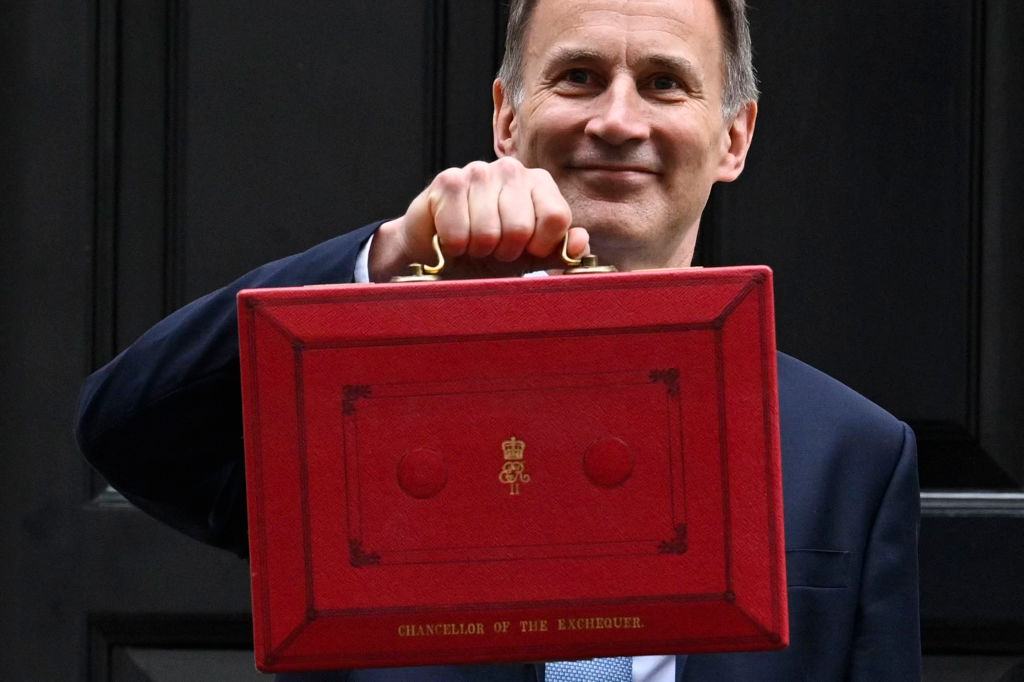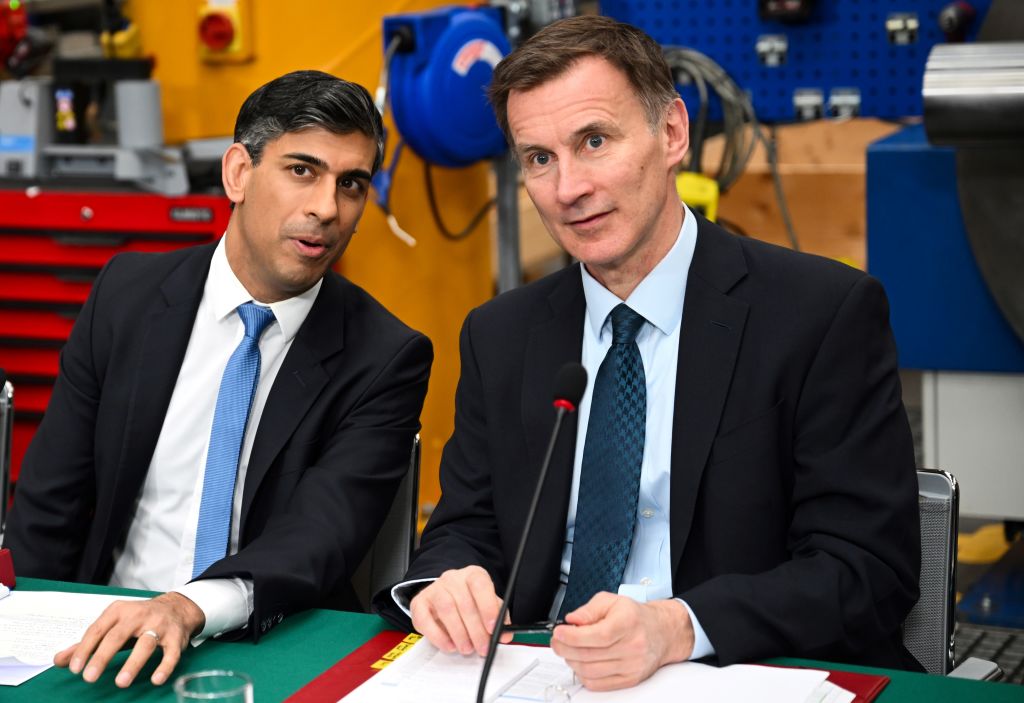How likely are Spring Budget tax cuts? What the economists say
Chancellor Jeremy Hunt is expected to announce some tax cuts in the Spring Budget. But analysts warn they may come at a price for the UK


Get the latest financial news, insights and expert analysis from our award-winning MoneyWeek team, to help you understand what really matters when it comes to your finances.
You are now subscribed
Your newsletter sign-up was successful
Want to add more newsletters?

Twice daily
MoneyWeek
Get the latest financial news, insights and expert analysis from our award-winning MoneyWeek team, to help you understand what really matters when it comes to your finances.

Four times a week
Look After My Bills
Sign up to our free money-saving newsletter, filled with the latest news and expert advice to help you find the best tips and deals for managing your bills. Start saving today!
Chancellor of the Exchequer Jeremy Hunt is now mere days away from delivering his Spring Budget speech.
The annual event, which will take place on Wednesday 6 March, always attracts a lot of speculation in advance about the government’s plans for taxation and spending. Given the UK recession, the country’s high tax burden, and the upcoming general election, the next Budget is garnering even more attention than usual.
So, what tax cuts are the most likely to be announced - and what do economists make of the prospect of cuts? Here’s what we know so far.
MoneyWeek
Subscribe to MoneyWeek today and get your first six magazine issues absolutely FREE

Sign up to Money Morning
Don't miss the latest investment and personal finances news, market analysis, plus money-saving tips with our free twice-daily newsletter
Don't miss the latest investment and personal finances news, market analysis, plus money-saving tips with our free twice-daily newsletter
What Spring Budget 2024 tax cuts could we see?
As a result of the significant fiscal drag being experienced by households across the country, as well as the upcoming UK election, Jeremy Hunt is being placed under huge pressure to cut taxes.
Economic pressure stems from the UK’s high tax burden, above-average inflation and GDP decline, while political pressure is being borne out of the Conservative Party’s dire performance in opinion polls. As such, it’s widely expected that the Chancellor is on the hunt for crowd-pleasing tax cuts.
Hopes of a tax cutting spree had been high after Hunt cut National Insurance by two percentage points in his Autumn Statement. Until only a few weeks ago, reports suggested the Chancellor was considering cutting the basic rate of income tax by up to 2p - so, a reduction from 20% to 18%.
However, with inflation failing to go down as expected in January, the Bank of England keeping interest rates frozen, and higher public debt servicing costs, the fiscal headroom Hunt was hoping to exploit looks as if it may have all but disappeared. So, commentators believe the measure has now been shelved.
According to the BBC, the Chancellor is now more likely to announce a single percentage-point cut to National Insurance. It’s been estimated that the measure would cost about £4.5bn to £5bn.
One effective tax cut that does seem almost-certain to be brought in is the continuing freeze to fuel duty. The existing 5p cut is due to expire at the end of March, but Hunt is widely expected to maintain the freeze for another year. Think tank the Resolution Foundation estimates the cost of this policy to be around £2bn a year.
Measures that have been demanded but aren’t widely expected to be implemented, include the abolition of inheritance tax and a VAT cut. Liz Truss’s Growth Commission think tank has claimed that ditching inheritance tax would boost tax revenues as it would keep 300,000 more people in the workforce. Meanwhile, hospitality businesses argue cutting VAT would help to keep them in business amid challenging economic conditions and a large rise in the minimum wage.

Jeremy Hunt and his boss Rishi Sunak face a big challenge to keep the Conservative Party in government.
What do analysts make of possible Spring Budget tax cuts?
The reports of potential tax cuts have received a frosty reception from economists and think tanks.
Respected think tank the Institute for Fiscal Studies (IFS) says there is a “weak economic case” for tax cuts given public sector debt is “barely on course to fall” by the end of the five-year window over which Jeremy Hunt intends to get debt falling as a percentage of GDP.
The think tank suggests the Chancellor should be clear with the public that any tax cuts would require post-election spending cuts. IFS research economist Martin Mikloš says: “In November’s Autumn Statement, the Chancellor ignored the impacts of higher inflation on public service budgets and instead used additional tax revenues to fund eye-catching tax cuts.
“At next week’s Budget, he might be tempted to try a similar trick, this time banking the higher revenues that come from a larger population while ignoring the additional pressures that a larger population will place on the NHS, local government and other services. He might even be tempted to cut back provisional spending plans for the next Parliament further to create additional space for tax cuts.
“The Chancellor should resist this temptation. Until the government is willing to provide more detail on its spending plans in a Spending Review [the process it goes through to determine departmental budgets], it should refrain from providing detail on tax cuts.”
Instead, the IFS suggests Hunt should seek to reform the tax system - a politically risky move given it may create losers as well as winners. Or, if he feels compelled to announce some form of tax reduction, to cut stamp duty.
Capital Economics, which shares the IFS’s scepticism of cutting future spending to pay for tax cuts, says poor economic forecasts have not prevented Hunt from splurging before and would be unlikely to do so again. Its deputy chief UK economist Ruth Gregory argues the government “does not score particularly well” on its fiscal sustainability, with tax cuts threatening its ability to absorb economic shocks and meet its debt obligations.
She says: “In the current climate of low GDP growth and high interest rates the government has less room to manoeuvre. Indeed, it probably now needs to run a surplus on the primary budget (i.e. excluding debt interest) averaging 0.6% of GDP over the next four years if it wants to avoid putting debt as a share of GDP on an upward path.”
Should the government decide to go ahead with tax cuts, Capital Economics says post-election spending plans will “almost certainly involve raising taxes”, with most of them likely to be brought in soon after the election - the so-called ‘trap’ the Conservatives are expected to set Labour, should it win the election. It adds that this situation would force the Bank of England to cut interest rates from the current 5.25% to 3% by the end of 2025.
Meanwhile, ING Economics, which forecasts that Chancellor Hunt has £18bn of headroom, says he could still bring in a 2p income tax cut. But it warns that the “situation is tight” and that its analysis may be “too optimistic”.
In its latest analysis, it says: “No chancellor ideally wants to spend all of his headroom in case the economic environment changes for the worse before a future budget. Previous chancellors have typically opted to maintain £20bn+ in headroom for exactly that reason.
“That leaves the Treasury with a choice. It may well need to scale back some of its tax-cutting plans. But given political pressure for tax cuts ahead of a likely election this year, he may be tempted to impose more spending restraint to help maximise the headroom available and get his tax cuts through.
“But this isn’t a particularly realistic option either. Remember that in order to win back markets after the 2022 budget crisis, Chancellor Jeremy Hunt promised sweeping reductions to previous spending plans. Those changes didn’t kick in immediately – and indeed won’t do until after the election. But what matters for the fiscal rule is that they are imposed by the five-year point.”
ING expects government departments, with the exception of health and defence, will face “steep real-terms spending cuts” in the future if Hunt goes ahead with tax cuts. It also warns that public investment will “fall sharply” as a percentage of GDP, which “doesn’t bode well” for the UK’s poor productivity.
The Treasury told MoneyWeek it won’t comment on speculation about whether or not its tax-cutting plans are affordable. It insisted the government is on track to meet Jeremy Hunt’s fiscal rules, namely to reduce the national debt and public borrowing as a percentage of GDP.
Get the latest financial news, insights and expert analysis from our award-winning MoneyWeek team, to help you understand what really matters when it comes to your finances.
-
 Should you buy an active ETF?
Should you buy an active ETF?ETFs are often mischaracterised as passive products, but they can be a convenient way to add active management to your portfolio
-
 Power up your pension before 5 April – easy ways to save before the tax year end
Power up your pension before 5 April – easy ways to save before the tax year endWith the end of the tax year looming, pension savers currently have a window to review and maximise what’s going into their retirement funds – we look at how
